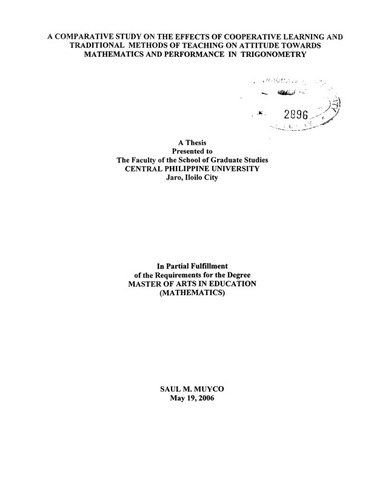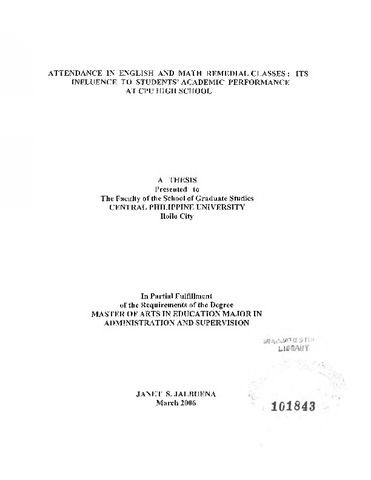A comparative study on the effects of cooperative learning and traditional methods of teaching on attitude towards Mathematics and performance in Trigonometry
| dc.contributor.author | Muyco, Saul M. | |
| dc.date.accessioned | 2021-02-20T07:29:44Z | |
| dc.date.available | 2021-02-20T07:29:44Z | |
| dc.date.issued | 2006 | |
| dc.identifier.citation | Muyco, S. M. (2006). A comparative study on the effects of cooperative learning and traditional methods of teaching on attitude towards Mathematics and performance in Trigonometry (Unpublished Master's thesis). Central Philippine University, Jaro, Iloilo City. | en_US |
| dc.identifier.uri | https://hdl.handle.net/20.500.12852/481 | |
| dc.description | Abstract only | en_US |
| dc.description.abstract | This study aimed to compare the effects of cooperative learning and traditional methods of teaching on the attitude towards mathematics and academic performance of First Year Information Technology students of the Western Visayas College of Science and Technology taking Trigonometry during the Second Semester of Academic Year 2005-2006. The subject of the study was First Year B.S. Information Technology students enrolled during the second semester, school year 2005-2006 at the Western Visayas College of Science and Technology. This study used the pre-test - post-test control - experimental group design. In measuring the performance in trigonometry, only a post-test was conducted. The students could not be tested for a prior knowledge in Spherical Trigonometry as this was not offered before in their previous year level. To obtain two (2) groups of the same performance, fifteen (15) students from each section were selected based on their midterm grades. Each student from one section was paired with one from another section who has more or less the same grade. To avoid the influence of other factors on the performance of the students in the midterm, the only components considered in the computation were scores in quizzes and midterm exams. The main instruments used in this study were a 40-item teacher-made test, and a 14-item questionnaire on attitudes towards mathematics, which was adopted from the graduate thesis of Prof. Regina G. Magno. For the descriptive statistics the frequency, mean and standard deviation were used. For the inferential statistics the t-test was used. The z-test was used to determine the difference between the two proportions in the attitude level and performance level. The Pearson-Product Moment Correlation Coefficient was used to determine the relationship between attitude towards mathematics and performance in trigonometry after the experiment. The point-biserial correlation was used to determine the relationship between the teaching strategy and attitude towards mathematics and teaching strategy and performance in trigonometry. Findings showed that before the intervention, although the mean attitude score of experimental and control groups were neutral and there was no significant difference between the two, there were more students of the control group who had positive attitude towards mathematics. After the intervention, the mean attitude scores of the experimental group and those of the control group remained neutral. Comparatively, however, there were more students in the experimental group whose attitude towards mathematics became positive than there were in the control group. Some of the students in the control group however who previously had positive attitude towards mathematics, developed either negative or neutral attitude towards the subject. Despite the improvement in the mean attitude score of the experimental group, the difference in the mean attitude scores of the experimental and control group was not significant after the intervention. Both groups improved in their mean attitude scores, but the increases were not significant. There was no significant difference either in the mean gains in the attitude of students towards mathematics after the intervention. This means that the difference in the improvement of mean attitude scores o f the two groups was not significant. There was a significant difference in the mean performance scores of the experimental and control group after the intervention, in favor of the control group. This implies that the performance of the control group is significantly higher than that of the experimental group. When the teaching strategy and attitudes of students towards mathematics were tested for relationship, there was no significant relationship between the two. In other words the teaching strategy has nothing to do with the attitude of students towards mathematics. When the mean attitude scores and means performance scores of the experimental and control group were tested for relationship, no significant relationship between the two was found either. This means that attitude towards mathematics does not affect trigonometric performance. The test for relationships between the teaching strategy and performance of students in trigonometry, however, showed a significant result. When the relationship between teaching strategy and performance in trigonometry was tested controlling for attitude in mathematics, the coefficient indicated a significant relationship between the variables. This means that the control group has a better performance than the experimental group. On the whole, it could be concluded that the traditional method of teaching is better in their effect on the performance of students in trigonometry than the cooperative learning method. | en_US |
| dc.format.extent | xii, 92 leaves | en_US |
| dc.language.iso | en | en_US |
| dc.subject.ddc | GSL Theses 378.272 M987 | en_US |
| dc.subject.lcsh | Group work in education | en_US |
| dc.subject.lcsh | Education, Cooperative | en_US |
| dc.subject.lcsh | Mathematics--Study and teaching | en_US |
| dc.subject.lcsh | Trigonometry--Study and teaching (Higher) | en_US |
| dc.subject.lcsh | Mathematics--Study and teaching (Higher) | en_US |
| dc.subject.lcsh | Trigonometry--Study and teaching | en_US |
| dc.subject.lcsh | Academic achievement | en_US |
| dc.title | A comparative study on the effects of cooperative learning and traditional methods of teaching on attitude towards Mathematics and performance in Trigonometry | en_US |
| dc.type | Thesis | en_US |
| dc.description.bibliographicalreferences | Includes bibliographical references | en_US |
| dc.contributor.chair | David, Fely P. | |
| dc.contributor.committeemember | Millamena, Leopoldo A. | |
| dc.contributor.committeemember | Chin, Fely P. | |
| dc.contributor.committeemember | Canaman, Jessica B. | |
| dc.contributor.committeemember | Valdez, Luis G. | |
| dc.contributor.department | School of Graduate Studies | en_US |
| dc.description.degree | Master of Arts in Education major in Mathematics | en_US |
| local.subject | Western Visayas College of Science and Technology (WVCST) | en_US |
| local.subject | Iloilo Science and Technology University (ISAT U) | en_US |





